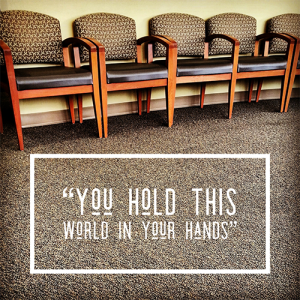At the start of this year, the youth ministry director at my church gathered all of the middle school small group leaders. He wanted to check in on how we were, hear how our groups were going, and encourage us. He shared how, when he has worked at Christian camps, everything is designed to help kids experience great moments, “highs,” and you have a very focused time with each group of kids to bring those highs about. In contrast, in congregational ministry, there are many distractions, and kids often are weighed down by day-to-day concerns.
Each type of ministry has its challenges, but how do you handle all the distractions and burdens kids bring week after week and month after month? Our youth director had wise words. He said you love the kids, let them know how much God loves them, welcome them with all their challenges, and pour yourself out for them. Then, when you get home at the end of the day, you cry with hope.
Cry with hope! What a beautiful phrase to express the hardness and goodness of Christian ministry. We cry because there is so much pain even as we hope because God is good. Cry with hope is an especially fitting expression for the ministry of Inheritance of Hope.
Our Legacy Retreats provide a unique experience to families facing the loss of a parent. They are a break from daily routines, focused on creating some great moments, meaningful highs. Significant struggles of daily life are still present, though, as the families deal with a parent’s terminal illness. At Legacy Retreats we have the highs of a one-of-a-kind experience and life-and-death struggles – all at once.
A couple of summers ago, I went to the funeral of a wife and mom in the IoH family. We had served her family at a Legacy Retreat only 8 months earlier. Her husband spoke at the funeral, including these lines: My wife was good at laughing. My wife was good at crying. My wife was good at laughing and crying at the same time.
That family, grounded in Christ yet facing death, experienced hope and pain – all at once. Laughing and crying at the same time. Cry with hope.
These expressions bring to mind a biblical passage. 1 Thessalonians 4:13-14 – “But we do not want you to be uninformed, brothers and sisters, about those who are asleep, that you may not grieve as others do who have no hope. For since we believe that Jesus died and rose again, even so, through Jesus, God will bring with him those who have fallen asleep.”
These verses indicate that we should not grieve as those who have no hope. They do not say we should not grieve at all – you might as well tell people not to breathe as not to grieve. So long as we are in this life, there will be cause for grieving. If we don’t grieve at grievous things, a major part of us would effectively be dead. The Bible is both realistic about grief and transformational on it. For realism, yes grieve, in this context over those who are “asleep,” meaning dead. For transformation, grieve differently than others – grieve as those who have hope.
Why? Cry with hope, laughing and crying at the same time, grieve as those who have hope – maybe these ideas sound good, but what reason is there for them?
There’s a simple reason. It may seem like a churchy answer, but in this case it’s the right answer. Our grieving should be different because of Jesus! 1 Thessalonians 4:14 plainly and squarely indicates that our (transformed) grieving is because Jesus died and rose again. We may be tempted to focus only on the rose again part, but both parts are essential.
- Jesus died: God knows grief and suffering and heartbreak. In Jesus, God personally experiences the grief of death.
- Jesus rose again: God makes good on the promise to overcome all grief and suffering and heartbreak. In Jesus, God personally experiences the hope of resurrection, life beyond death’s influence.
- Put them together, and we see that the God of Jesus Christ is the grieving God of living hope. God grieves and is hope – all at once.
That’s the God we serve. That’s why we grieve as those who have hope.
The privilege of serving with Inheritance of Hope is getting to love families in the name of Jesus Christ, the grieving God of living hope. So, with the families, let’s grieve as those who have hope. Let’s laugh with them and cry with them at the same time. Let’s cry with hope with them. Let’s celebrate hope, even while our hearts are breaking. Let’s love these families – with fullness of grief, yes, because Jesus died… and with fullness of hope, because Jesus rose again.

